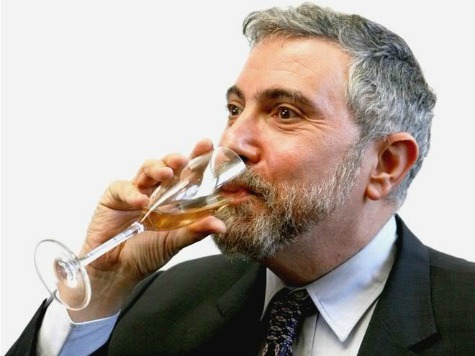It is not unheard of for Nobel Prize winners to do things that call their early achievements into question. It’s easy to name examples among the Peace Prize laureates–who are but politicians, after all–but the intellectual winners do it, too. Chemist Linus Pauling won in 1954 for his research on chemical bonds, for instance, but later indulged medical quackery about the miraculous healing powers of Vitamin C.
That, at least, was in a different scientific field: economist Paul Krugman enjoys the dubious distinction of quackery in his own area of expertise.
In today’s New York Times, Krugman praises President Barack Obama’s forthcoming State of the Union speech for its focus on inequality. As usual, he frames his argument as an attack on what he calls “fiscal scare tactics” from the Republicans. He even claims that Franklin Delano Roosevelt’s nod to austerity after 1936 is what led to the 1937 recession. I will leave to historians to debate that rather hackish history: it suffices to note how easily a partisan like Krugman tosses aside liberalism’s great ideological hero for the sake of present political exigencies.
Yet that is not the worst of it. Krugman actually writes the following, in applauding Obama’s inequality focus: “there’s an even stronger case to be made that high unemployment–by destroying workers’ bargaining power–as become a major source of rising inequality and stagnating incomes even for those lucky enough to have jobs.”
What he is trying to say, perhaps, is that the prospect of unemployment means workers are less willing to push for higher wages. Yet the correlation between workers’ bargaining power and employment is a negative one.
Krugman surely knows this. It is a function of supply and demand. When unions raise the cost of labor, by pushing for higher wages and benefits, firms cut jobs or hire fewer people. It is also an empirical fact: states with right-to-work laws generally have faster economic growth and lower unemployment than states with union-dominated politics. In Wisconsin, Gov. Scott Walker was able to save thousands of state and local jobs by reducing public sector unions’ stranglehold. And given a choice, workers increasingly choose not to join unions.
Moreover, Krugman surely knows that most–if not all–attempts by governments around the world to intervene in economies to reduce inequality have resulted in more inequality. Five years of Obama offer many examples.
Towards the end of the article, Krugman gives the game away: “the most important reason for Mr. Obama to focus on inequality,” he says, “is political realism.” In other words: it might not make economic sense, but it makes political sense.
That, at least, is an honest admission by Krugman about his true purpose here. He wants Democrats to win, hence economic reality must be suspended until Obama once again has the power to spend freely.
Note to Krugman: it wasn’t Roosevelt, but Herbert Hoover, who tried to spend his way out of depression.

COMMENTS
Please let us know if you're having issues with commenting.